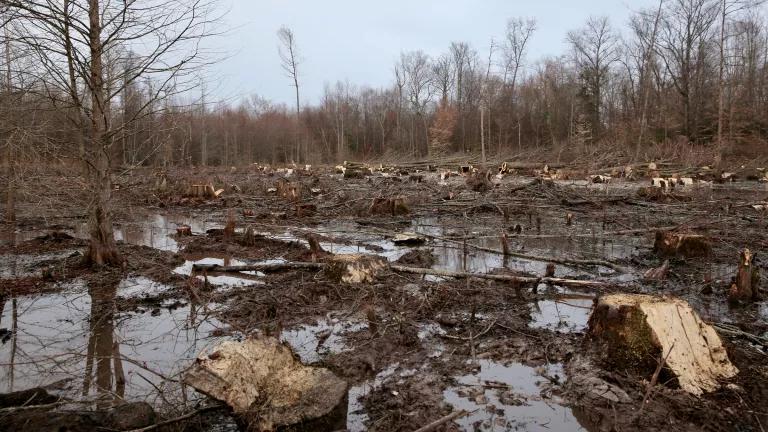Landmark EU Law Enshrines Protections for Primary Forests
The broken forest policy framework that obscured the Global North’s responsibility for forest destruction just came crashing down.

With the stroke of a pen in the European Union, the broken forest policy framework that, for three decades, obscured the Global North’s responsibility for forest destruction just came crashing down. Just hours before the start of the UN biodiversity conference in Montreal (COP15) and despite obstructionist efforts from Canada, the European Parliament reached an agreement on a groundbreaking trade regulation that is poised to transform global forest supply chains and usher in a new, more globally equitable era of forest protection. For the first time, forest policy will hold Canada and other northern countries accountable for their impacts by addressing not just deforestation, but also forest degradation–defined explicitly to include industrial logging in irreplaceable primary forests.
For years, international attention has fixated on deforestation in the Global South, marshaling both righteous indignation and financial resources toward addressing the razing of the tropics. But while all eyes have been focused below the 24th parallel, countries in the Global North have been destroying climate- and species-critical forests under the banner of “sustainable forest management.”
Industrial logging in the Global North in countries like Canada, Sweden, and the United States is the single largest driver of tree cover loss in the world. Canada, which clearcuts more than 1.3 million acres of forest each year, ranks third globally in the loss of both tree cover and intact forest landscapes, after only Russia and Brazil. Much of this logging occurs in irreplaceable primary forests, which are those that have never been previously industrially disturbed and have unique value for the climate and species, driving carbon emissions on par with certain fossil fuel sectors and species declines that push the world closer to an unlivable future.
Yet all of this has been invisible on the global stage. The Global North’s logging operations have evaded categorization as “deforestation” because industrial logging, by the crudest definitions, technically keeps a forest as a forest—even if what regrows is a pale shadow of what was there before. Countries like Canada, therefore, can claim near-zero deforestation despite their significant toll on primary and other essential forests. Industrial logging of primary forests would instead be categorized as “degradation,” a term that had little purchase in regulatory policy—until now.
The EU, with its new forest regulation, has finally removed the veil from the Global North and expanded beyond the long-entrenched “deforestation”-focused framework. The law requires companies to not only verify that goods sold within the EU are not linked to deforestation, but also that they haven’t driven forest degradation—which the regulation explicitly states includes industrial logging in primary forests.
The regulation marks significant forward progress toward the realization of the commitments in the Glasgow Leaders’ Declaration on Forests and Land Use, which commits its more than 140 signatories to ending both deforestation and degradation by 2030. The Glasgow Declaration set the stage for global action on forest degradation, but in the year since its signing, countries like Canada have largely ignored this pillar of the agreement.
The European Parliament’s agreement also comes just days after news broke that Canada has been attempting to weaken the regulation. Citing its “world-class forest leadership” and attempting to cast doubt on the workability of a degradation provision, Canada lobbied to have the degradation provision removed from the text, which would essentially have once again allowed the Global North to evade scrutiny of its logging industry.
Instead, the EU chose science.
The EU lawmakers did fail to follow through on one essential element of the regulation, however: guarantees for indigenous rights. The regulation was an opportunity to enshrine the internationally recognized Indigenous right to free, prior and informed consent for any industrial activity on their traditional territory. Instead, the regulation hinges that requirement on a legality requirement, only holding countries to that standard if they have already enshrined it in their own laws. This backslide is a significant blow to global rights frameworks and to the Peoples who not only have stewarded the land for thousands of years, but have been at the forefront of advancing ambitious forest protections and the creation of more sustainable economies. The EU, as it finalizes this policy, needs to course-correct and ensure that the strength of its protections of human rights is commensurate with the rest of the policy.
Once the European Council and European Parliament both officially approve the law, large companies will have 18 months to comply with the regulation’s requirements before facing large fines, while smaller companies will have a longer runway.
Canada’s policymakers now need to make up for lost time, quickly disentangling its policies from the greenwashing, denialism, and misinformation that have informed its approach to forests. In addition to taking long-overdue measures to ensure industrial logging doesn’t come at the expense of primary forests, Canada needs to reflect the value of these forests in its policies, from forest carbon accounting and regulation, to its position on pending legislation like the New York Deforestation-Free Procurement Act.
With this new regulation, the EU has breathed new life into the COP15 negotiations Canada had deflated with the revelations about its obstructionist efforts. This regulation sets the stage for a Global Biodiversity Framework that is equal to the task of pulling the biosphere back from the brink, with strong protections for primary forests and other vital ecosystems. Now, the delegates in Montreal need to deliver on that potential.




